Thursday, August 14, 2025

As the Artificial Intelligence revolution transforms higher education, UNT Dallas is committed to embracing AI technology to enhance teaching and learning – and ultimately
preparing our students for promising careers.
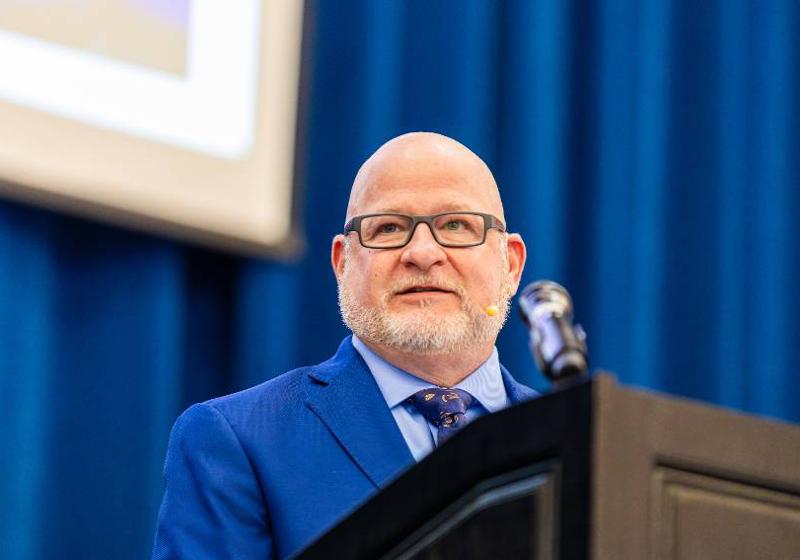
University of North Texas at Dallas Provost, Dr. Christopher Markwood
The university’s goal is to stay at the forefront of AI. Ambitious plans are well
underway to harness the strengths of AI, while ensuring it is used ethically, transparently
and with the utmost integrity and the most positive outcomes. “AI innovation will
revolutionize the workplace and the world. It will create opportunities that don’t
yet exist that our students can’t yet imagine,” said Dr. Christopher Markwood, Interim Provost. “It is imperative that our students fully understand the potential
impact of AI on their educational and career paths.”
Transformative Year
The 2024-25 academic year marked a significant period for AI transformation at UNT
Dallas. Employees received hands-on training from emerging AI education experts, including
Dr. Jose Bowen, coauthor of Teaching with AI: A Practical Guide to a New Era of Human Learning.
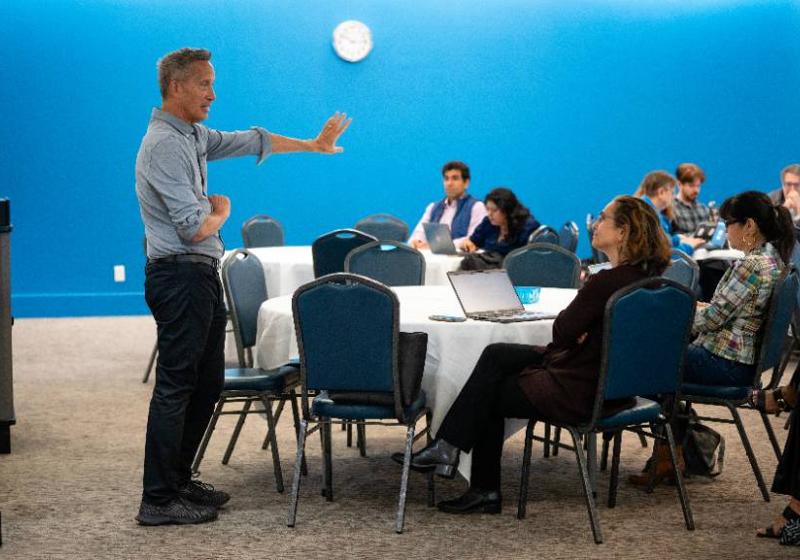
Dr. Jose Bowen Leads an AI Workshop for Faculty and Staff at The University of North Texas at Dallas
Training took various forms, including in-person presentations and demonstrations, webinars and virtual informational sessions, and micro-credential courses. There were three overarching goals for the training: Advance understanding of AI by building knowledge, foster collaboration by creating an environment for AI exploration and discussion, and support AI integration by helping faculty incorporate AI in teaching.

Dr. Cathy Scott, Inaugural Director of the UNT Dallas Center for Innovation in Teaching and Learning (CITL)
"During the 2024–25 academic year, UNT Dallas laid the groundwork for integrating
AI across campus by introducing foundational concepts to faculty and staff through
workshops and the launch of our first AI Community of Practice, said Dr. Cathy Scott, Inaugural Director of the university’s Center for Innovation in Teaching and Learning
(CITL). “In 2025–26, we will build on that momentum by embedding AI more deeply into
student learning experiences, as well as faculty and staff workflows.”
Engaged and Committed
Both faculty and non-teaching employees engaged thoroughly in AI development, with 67% of faculty and a combined total of 138 faculty and staff members participating in AI learning during the 2024-25 academic year. During the first quarter of 2025, all faculty members were invited to attend three sessions facilitated by Bowen, which addressed specific areas such as AI tools and techniques, writing, cheating, detection and related AI policy, and AI assignments and assessments. An impressive 94% of the participants said they learned at least one AI-related strategy that they planned to implement in their future teaching.
“So many of our faculty have demonstrated a deep commitment to learning to use AI
so that they can wisely teach students to use AI – and when not to use AI to ensure
they are still learning critical thinking skills,” said Dr. Milan Sevak, Associate
Vice President for Strategic Partnerships and Innovation. Sevak also serves as Executive
Director of the UNT Dallas Center for Socioeconomic Mobility Through Education (CSME).
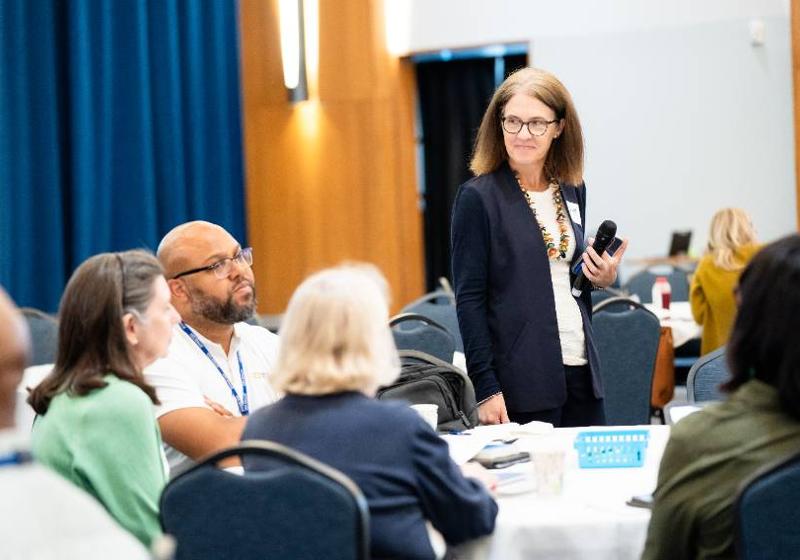
University of North Texas at Dallas's faculty and staff members listen intently during an AI workshop
Separate from the formal training sessions, 17 faculty members representing all four
UNT Dallas schools and the College of Law met monthly between November and April. Their goal was to learn from each other to
improve AI teaching and learning and to enhance research using AI.
Incentives & Bots
To encourage AI adoption and further motivate instructors to incorporate the technology
in their teaching, $5,500 in grants was awarded by the administration to 11 faculty
members, each receiving $500. They used the funds to explore AI tools of their choosing
for multiple purposes. Among them: Designing curriculum and improving teaching materials;
crafting assignments and creating study guides and quizzes; documenting workflows;
facilitating research collaboration; developing bots and a digital study buddy. “It
has been truly inspiring to see how our faculty have been using generative AI tools
in so many ways to enhance their impact. I was personally excited to see the ways
these tools are facilitating deeper learning for students, such as by creating AI-powered
simulations,” said Dr. Sevak.
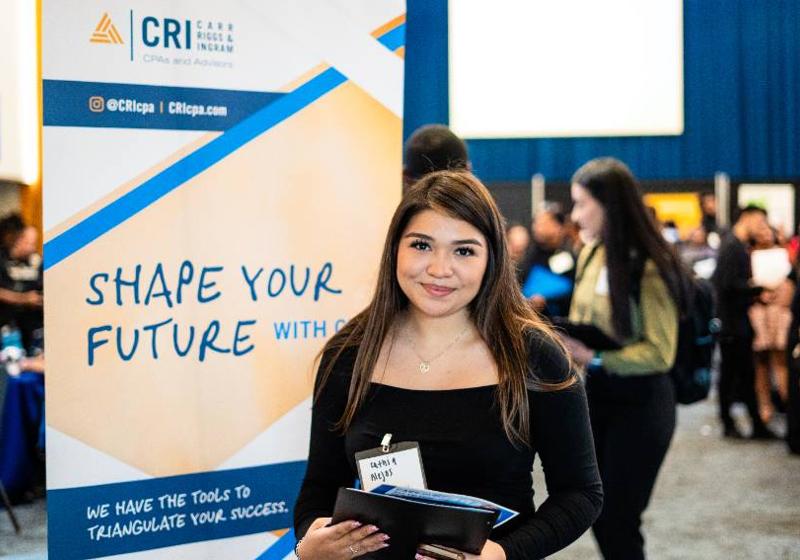
Career Fair at UNT Dallas, where AI related skills and opportunities will be discussed by employers and students
The use of bots, also known as CustomGPTs, was an opportunity for collaboration among faculty and students. A CustomGPT (Custom Generative Pre-Trained Transformer) is an AI model fine-tuned to perform specific tasks, such as generating content, answering questions, or assisting with research, based on a predefined set of data, instructions, and parameters. For example, the Department of Digital Learning and Instructional Technology (DLIT), led by Dr. Sara Baber, created a bot for Trailblazer Tech Support on the DLIT webpage.
The College of Law presented webinars on "Building Your First Legal Bot" and "Using GenAI Bots to Improve Learning." Led by Professor Korin Munsterman, Director of Legal Education Technology and Professor Aryele Maye, these workshops showed faculty and students how to automate routine tasks, improve teaching and learning, and enhance efficiency in instruction and scholarship. The goal was to show webinar attendees how readily available tools can empower them to unlock new levels of productivity and innovation.
Munsterman and Maye also presented "AI Amicus Curiae: Bots As Friends of Law Students" at CALICon 2025, a legal education and technology conference in Atlanta.
Faculty in Focus
Ten faculty members who teach the English language came together and produced a plan
to update two courses taken by all first-time-in-college (FTIC) students. Their goal
is to ensure students are learning about how to use AI responsibly, effectively, and
with academic integrity, while also supporting critical thinking and career readiness
skills.
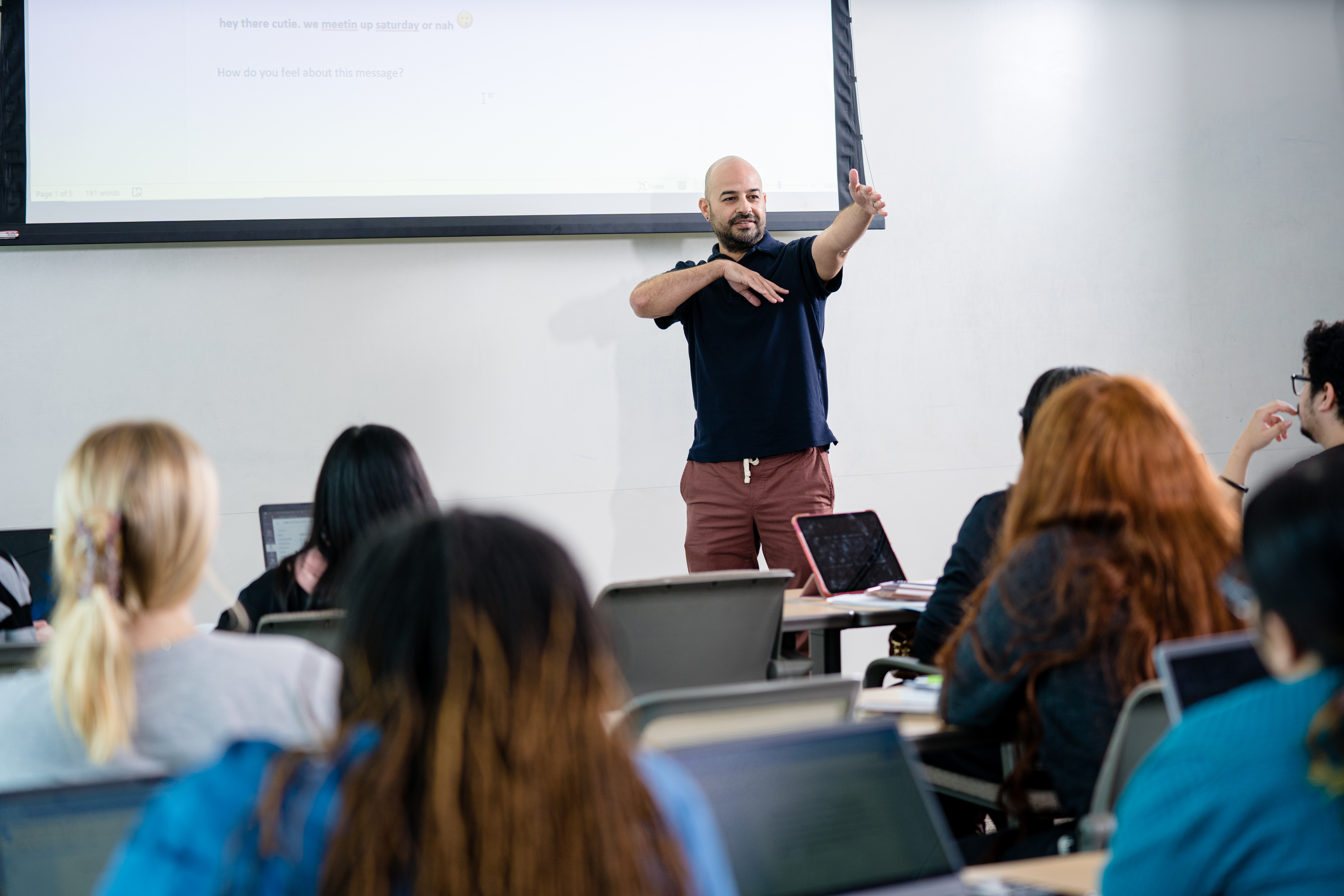
Robert Tinajero, Associate Professor of English and Rhetoric, makes a point to students during a UNT Dallas english class
“Obviously, Artificial Intelligence is extremely relevant to the world of higher education as it affects students, faculty, and staff,” said Robert Tinajero, Associate Professor of English and Rhetoric and Program Coordinator for the English and Writing Program. “UNT Dallas is showing a commitment to being a leader in AI-aware pedagogy whose aim is to develop strategies to help students avoid using AI while also teaching them how to strategically and ethically use certain AI tools.”
Multiple faculty attended AI conferences outside the UNT Dallas campuses. Seven presented
at the Teaching & Learning with AI Conference in Orlando, and two presented at the
AAC&U (American Association of Colleges and Universities) Conference on Learning and
Student Success (CLASS) in Puerto Rico.
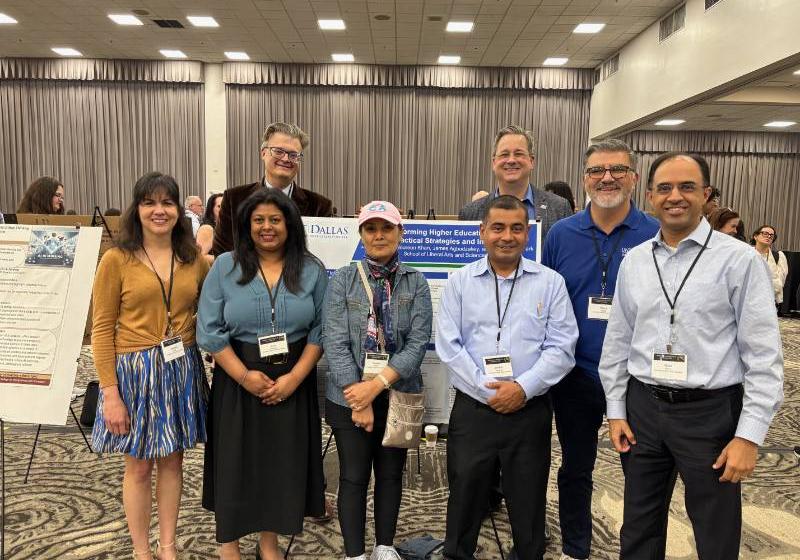
UNT Dallas leaders and faculty members including Dr. Milan Sevak (on the far right) at an AI conference in Orlando
Faculty, staff and students took advantage of two free AI Fundamentals courses developed
by our fellow campus, UNT, in Denton. By completing both parts, they earned a microcredential,
which included a digital badge as acknowledgment of their accomplishment. 133 participants
completed the two parts and received their microcredential.
Research Projects
Two AI-related research projects by UNT Dallas faculty were awarded grants by CSME. Through CSME, CITL, and other university organizations and initiatives, Dr. Sevak, Dr. Scott and Provost Markwood have been leading efforts to advance the use of AI through their consistent messaging, programming, and advocacy.
From the School of Behavioral Health and Human Services (BHHS), Drs. Alex Colvin and Crystal Benjamin received a CSME grant for their project, “Exploring Artificial Intelligence Integration
into Psychotherapy Practice.” And Dr. Janet Hanson, from the School of Education, received a CSME grant for her research, “Integrating AI-Facilitated Technologies
in Graduate Education Programs Serving Low SES Minority Students from Disadvantaged
Backgrounds.”
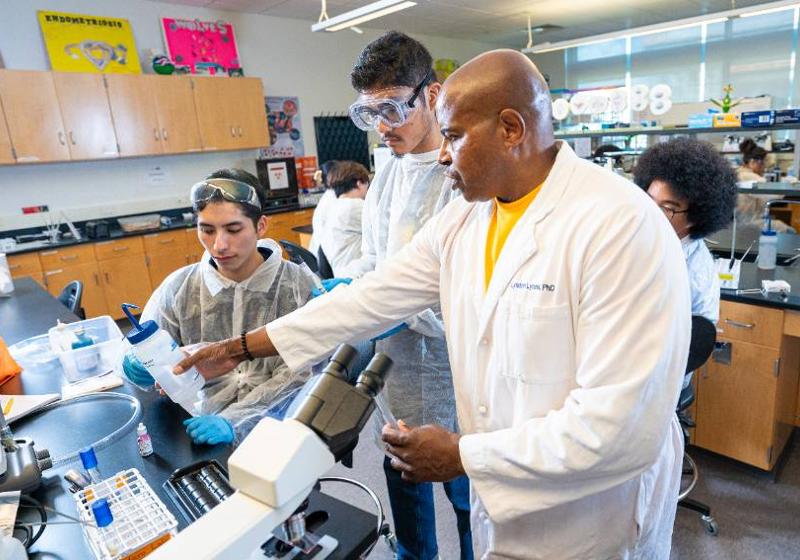
AI Technology Could Affect How Professors Teacher and Students Learn in This UNT Dallas Science Lab
“Our faculty is actively acquiring knowledge and sharing knowledge of AI,” said Markwood.
“Their engagement with AI is impressive and will only accelerate in the coming months
and years – all for the benefit of our students in all schools at all levels.”
AI Action Plan for 2025-26 & Beyond
As the new academic year begins, more exciting AI initiatives are planned. Dr. Sevak will be leading a team of faculty and staff who will develop and implement a new AI Action Plan. CSME and CITL are partnering to provide additional AI learning opportunities. And the university has recently been accepted into the 2025-26 Institute on AI, Pedagogy, and the Curriculum at the AACU.
Everyone is highly encouraged to participate. Students, faculty and staff will all be touched, with multiple opportunities to embrace new technology, learn new skills, teach in new ways, and ensure all UNT Dallas students are 100% career-ready when they graduate.
“Our goal is to empower the university community to reimagine what’s possible when leveraging AI to elevate academic engagement, enhance operational efficiency, and prepare students for the demands of an AI-driven workplace,” said Dr. Scott.
From UNT Dallas News – Future Student & STEM